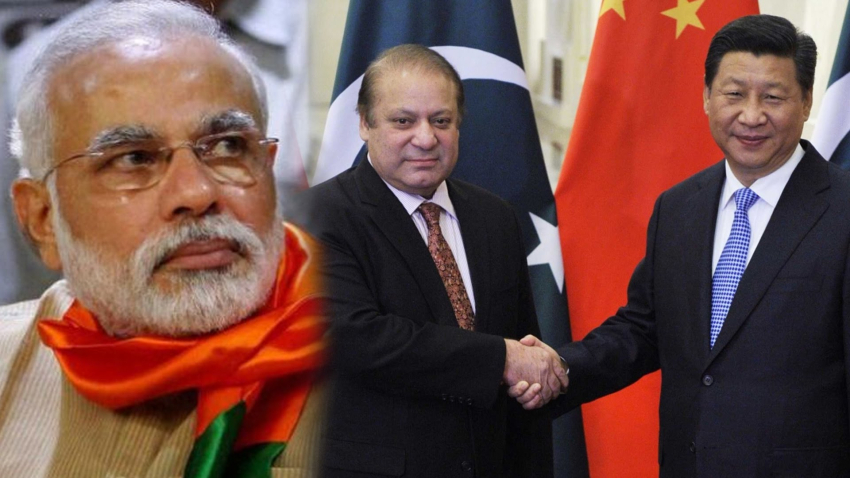The reported offer by China’s ambassador to India to rename China-Pakistan Economic Corridor (CPEC) and bring New Delhi on board Beijing’s ‘One Belt, One Road’ initiative has generated a whole new debate. While the remarks, made during a closed-door session at New Delhi’s military think-tank United Services Institute (USI), have now been removed from the website of the Chinese embassy in India, they did raise several questions in the minds of observers in Pakistan, in India, in China and elsewhere.
The key questions being raised are, firstly, whether the envoy made the offer after due consultations with his ministry back home, and, secondly, whether or not Pakistan was consulted in the matter.
As is well-known, while OBOR as a whole is an inter- and cross-continental plan involving a broad range of infrastructure and other developmental projects, CPEC primarily is a bilateral initiative, though, not exclusive and notwithstanding its regional and global linkages. The two primary partners – Islamabad and Beijing – one hopes, would think and act in sync with each other, in all matters related to CPEC when it comes to the involvement of any other nation, especially a country such as India, as in this case.
OBOR has received mixed responses from governments and societies around the world. Responses depend on how these countries and societies actually view the rise of China, and its newfound global role, as well as the role that China is going to assume in the years ahead, on the back of its economic might. At the same time, responses are also reflective of the overall nature of relations that a country has with China and the resulting feelings of its people towards Chinese people. Furthermore, the responses a country or a society gives to OBOR also depict that country’s relationship with the global powers which are competitors of China, notably the US.
It is clear that India has not so far accepted the overall idea of OBOR with an open heart, although at official level New Delhi gives mixed signals that it can also work with China on this grand initiative. The way the Indian finance minister mocked it at an event in Japan last week speaks for itself.
New Delhi is, understandably, staunchly opposed to CPEC passing through Gilgit-Baltistan (GB) region, based on what Indians term “a violation of sovereignty”. The Indians also realise that CPEC is the most important corridor that links ‘the Belt’ in the north to ‘the Road’ in the south and that without CPEC, OBOR becomes a disjointed initiative. So it has been their consideration since 2013, the year OBOR and CPEC were formally unfolded for the public eye, that at the broader level, the OBOR may not be rejected altogether, but such should be the criticism of CPEC that the whole concept of OBOR becomes controversial at the global and regional level.
It has so far been good to note – from a Pakistani perspective – that China does not pay much heed to India’s criticism on CPEC and also that now the United Nations’ Security Council has also endorsed the vision of OBOR (though not specifically CPEC). Such ‘offers’ by high-ranking Chinese officials, though, give a mixed message for Pakistan – nonetheless, it may be understood as a need to secure India’s participation at the coming Belt and Road Forum in Beijing, on May 14 and 15, where more than 100 countries are participating. However, New Delhi is yet to confirm its participation.
What one cannot ignore is that the feeling in India, as expressed in the prevailing overall discourse, is that OBOR, and specially CPEC, is detrimental to India’s core international interests, and thus, steps need to be taken to try to ounter, or at least decrease the vitality of, these initiatives. It is by no means about e name, or bilateral character of CPEC.
India’s cold shoulder response to Bangladesh-China-India-Myanmar (BCIM) Economic Corridor, the important South-Asian component of OBOR, is not going unnoticed anywhere. Instead, India has put more focus on Bangladesh-Bhutan-India-Nepal road transport agreement to attempt to snub Pakistan (in terms of SAARC) and China (vis-à-vis OBOR) at the same time.
It does not need to be mentioned that to deliberately pinch and antagonize China, Indians are continuously initiating new development projects in Arunachal Pradesh, the northeastern state which China considers a part of Tibet. India also organizes frequent visits of the Dalai Lama to the state, which angers China. This is India’s attempts to retaliate against CPEC. Besides, India has been playing with China’s conflicts involving nations such as Vietnam, in South China Sea, by signing defence cooperation and oil and gas exploration agreements in waters which are disputed between China and nations of Indochina region.
However, the main point in this regard is India’s close and increasing strategic partnership with the US – with maritime cooperation at the core of it – which, among other objectives, also seeks to cement India’s dominance of the so-called ‘Indian Ocean’, and in recent years has primarily been targeted at keeping the Maritime Silk Road part of OBOR under constant joint vigil of New Delhi and Washington D.C. This may turn out to be detrimental for Chinese initiatives and long-term interests.
Modi regime’s enhanced focus on Chabahar port in Iran, to compete with and possibly sabotage Gwadar, which is the key port for OBOR; modernization and equipment of a ‘Blue Water Navy’, to keep a dominance over the high seas of vital significance for China; Project Mausam – developing maritime ‘cultural’ linkages with the countries of the ‘Indian Ocean; and the SagarMala (the garland of the Ocean) Project that seeks to put in massive investments into India’s old and new ports, all are directed at countering and competing with OBOR in more ways than one.
It is quite relevant to mention here that India’s designs to sabotage CPEC in Balochistan, GB and elsewhere in Pakistan – with a special cell of RAW reportedly assigned the task – have come to the fore in the past few months. No offer would appease India in such a scenario, if the bigger picture is any guide. It is in no way all about CPEC’s passage through GB and its name. Keeping Pakistan under pressure is one thing, the Indian elephant’s ambitions against the Chinese dragon go beyond this.














